Eight of cycling's most glorious transfer failures
When transfers go bad: From Berzin to Vainšteins








This story was first published on October 9, 2009. Read our 'Seven transfer flops of 2016' here.
While the transfer merry-go-round remains in full swing and riders switch teams in optimistic bids to improve both salary and prospects, it’s worth remembering that for every Vande Velde to Garmin or Gerrans to Cervélo, there's a rider at the opposite end of the spectrum. Cyclingnews takes a look back in time at some of the sport's most glorious transfer failures.
Mr Final Paycheck: Maurizo Fondriest, Roslotto to Cofidis, 1997
Tony Rominger, Lance Armstrong, Igor Astarloa: Cofidis could create a whole team of misfits from the riders they've signed since joining the sport in 1997. However, one figure that stands out from the crop is Maurizo Fondriest. Signed from Roslotto, the Italian, who was by then approaching his 34th birthday, was way past his best.
The 1988 World Champion only rode a handful of races with Cofidis before having contract annulled by mutual consent in 1998, citing recurring back problems. In fact, he had a chiropractor flown in on the eve of the Tour of Flanders just to get him back on the bike in time for the race.
Mr One-hit-wonder: Romāns Vainšteins, Vini Caldirola to Domo Farm Frites, 2001
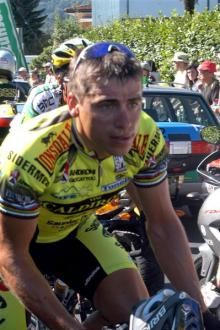
As he stood atop of the podium, eyes watering as he dedicated the win to his late father, many tipped him for greatness. They included Patrick Lefevere who offered Vainšteins a £600,000 contract at Domo. However Vainšteins, who left his wife and child and married, Elisabetta, the daughter of Vini's owner, now had a taste of the fine Italian lifestyle and it soon went to his head.
Get The Leadout Newsletter
The latest race content, interviews, features, reviews and expert buying guides, direct to your inbox!
"He came to the first training camp overweight and out of form. Johan Museeuw was coming back from a horrendous motorbike injury and even he was stronger than Vainšteins," Lefevere says.
Despite the weight problems Vainšteins still recorded some impressive results, third in Paris-Roubaix among them, but by the end of the 2002 he'd left Domo after two disappointing years. According to Lefevere he was a totally different rider once he signed, lacking the motivation and hunger that served him so well at the start of his pro career. He briefly rode for Lampre but his career quickly petered out.
Mr Bump: Cadel Evans to Team Telekom/T-Mobile, 2003
When Mapei disbanded in 2002 Evans was one of the hottest talents on the market. He'd transferred from a successful career on the dirt, earned his spurs as a stagiaire with Saeco, before wearing the pink jersey in the Giro d'Italia and finishing fourteenth overall. Surely greatness beckoned when he signed a contract with Team Telekom.
Alas, his time with the rigid German squad was a disaster. He broke his collarbone four times in two years, was dubbed a 'peculiar guy' by Andreas Klöden, never rode a Grand Tour and suffered the shame of Jan Ullrich personally asking for Evans to be left out of the Tour team. "Cadel is a good climber, but doesn't have the experience. We had doubts that he would make it to the end of this difficult Tour," said T-Mobile general manager Walter Godefroot as to why Evans wasn't named.
Like Bobby Julich, who had a similar experience with Telekom, Evans would flourish in a more relaxed environment. He moved to Davitamon-Lotto, where he's finished second in the Tour twice and, of course, won the World Championships last month. He'll line up for next year's Tour as one of the favourites. Not many of the boys in pink can say that.
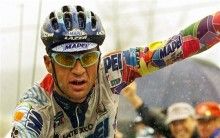
Michele Bartoli was one of the most successful Classics riders in the mid-to-late nineties. He picked up two superb wins in Liège, one in Flanders and two World Cups to boot. At the same time Mapei were crying out for a new leader after the departure of Abraham Olano. Their first choice was Giro and Tour double winner Marco Pantani, but when he refused to join the team Mapei was forced to turn to Bartoli. It didn't exactly sow the seeds of a great relationship and the Italian, despite a breathtaking win in Flèche Wallonne in 1999, never lived up to expectations.
The self-titled 'Warrior' was involved in several team disputes and suffered a horrendous injury in his first season when he broke his knee. There were arguments with the team trainer Dr Aldo Sassi, who wanted to ban Bartoli from working with long-time trainer Luigi Cecchini, and a falling out with Paolo Bettini that culminated in Bartoli throwing his bike at his former friend at the Plouay World Championships, in 2000.
Deep down the knee injury reduced his power and he was never quite the same. That, coupled with Bettini's rise from faithful lieutenant to leader, had an irrevocable effect on him. At one point the situation became so bad that he stopped turning up for races Mapei had selected him for. His contract was rescinded in 2001 and he signed for Fassa Bortolo soon after.
Mr Unfulfilled Potential: Mark Scanlon to Rabobank, 1999
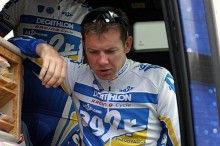
A contract with Rabobank followed and all expected Scanlon to become a hit. However, as he struggled with injury and form the biggest obstacle became homesickness. "I think homesickness was a big problem," remarked Sean Kelly. "Some guys get over it after a while, but others never do and always suffer from it."
Scanlon subsequently drifted from team to team in Europe and then the US, but quit the sport in 2007. He's now a prison warden. "I got it into my mind that I wasn't good enough, that I didn't have the ability any more."
Mr Last-chance Saloon: Evgeni Berzin to La Française des Jeux, 1998
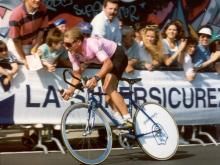
However, despite talking a good fight at the start of the 1998 season, the freedom Madiot afforded the Russian wasn't enough to help him rebuild his career and he left after just one year. "I know some riders and teams had problems with him but I thought he was nice enough," says Chris Horner, his roommate in 1998. "He had a few troubles with mechanics, but apart from that he was fine to be around. He didn't speak much English so we didn't talk much but he was fine. The team let him do all the races he wanted but he just couldn't produce anything."
Madiot, who'd gone out on a limb to sign the Russian, was more honest in his appraisal: "He was cooked. It was already game over for him. He had two breaks [in his time] with us, one in Liège-Bastogne-Liège and the other one at the Four Days of Dunkirk. Had he been more agile on a bike, he could have won Liège-Bastogne-Liège. The rest of his career proved that his good days were behind him, no matter what."
Berzin moved back to Italy, riding for a number of small Italian teams. He later served a ban after failing International Cycling Union (UCI) health checks. Despite rumours of a comeback with Tinkov in 2008, he's still living in Italy, running a car dealership.
Mr Fisticuffs: Jeroen Blijlevens to Polti, 2000
'Jerommeke', as he was affectionately known, started racing at the age of eight and won a total of 73 races in a career that spanned a decade. He was blisteringly quick, picking up the scalps of every major sprinter in both the Giro and Tour on numerous occasions. A move from TVM to Polti changed everything for him though, and in the subsequent four years he won just four races.
"I had a good Giro and thought that Italy would suit me," Blijlevens says. "But the sponsor pulled out. As soon as it was made public everyone started to work for themselves and that harmed me. I was trying to get used to a different country too."
The situation exploded at the Tour that year when Blijlevens, who'd completed the whole race without winning a stage. lashed out at Bobby Julich on the Champs-Élysées in Paris. He threw several blows at the American, who he'd felt had impeded his sprint throughout the race. Blijlevens Quick-Stepped it to Belgium where he tried to re-model himself as a Classic rider, but in doing so he lost his edge in the sprints.
Mr Three-way: Aitor Gonzalez to Fassa Bortolo, 2003
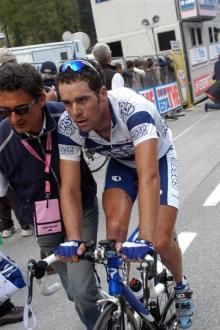
However, the Spanish race was marred by his supposed back-stabbing of teammate and race leader Oscar Sevilla on the Alto del Angliru. A nasty and protracted set of negotiations between Fassa Bortolo, Domina Vacanze and Kelme ensued and by the time Gonzalez was allowed to race in March, he was already overweight and out of form. A mediocre Giro followed where he finished 19th, winning one stage. He quit the Tour de France after just one week and the following year finished 45th, again with a stage win to his credit. But by then Fassa had grown tired of his poor form and he was offloaded to Euskatel for the 2005 season. The rest is history.
Daniel Benson was the Editor in Chief at Cyclingnews.com between 2008 and 2022. Based in the UK, he joined the Cyclingnews team in 2008 as the site's first UK-based Managing Editor. In that time, he reported on over a dozen editions of the Tour de France, several World Championships, the Tour Down Under, Spring Classics, and the London 2012 Olympic Games. With the help of the excellent editorial team, he ran the coverage on Cyclingnews and has interviewed leading figures in the sport including UCI Presidents and Tour de France winners.
Most Popular


